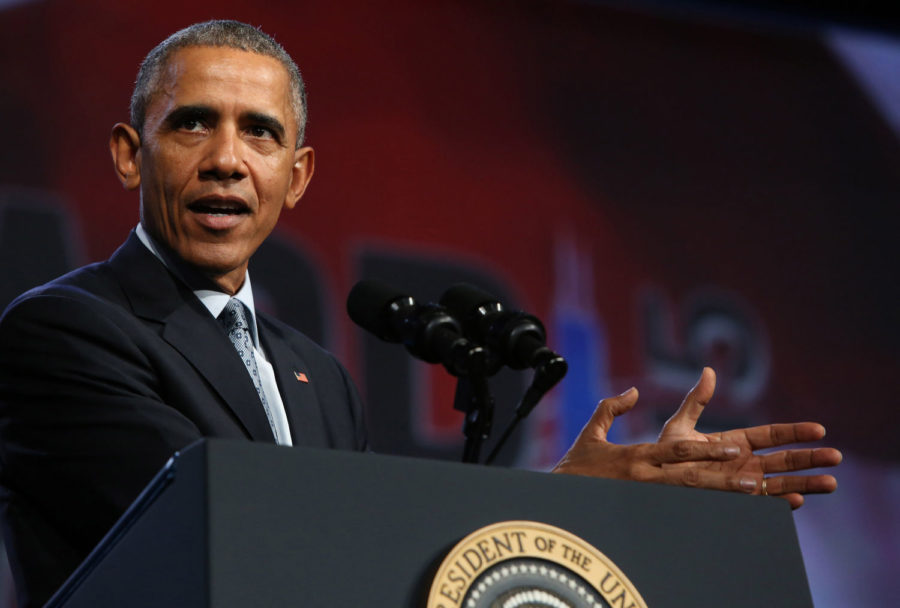Obama confronts a failure of his presidency in Illinois capital
February 8, 2016
Presidents in the final year of their terms love to highlight their legacies. When Barack Obama journeys to the Illinois state capital this week, he’ll instead point up one of his presidency’s greatest failures.
National political divisions and partisan rancor have grown worse, not better, under Obama, a development he has acknowledged as one of the biggest regrets of his administration. And Springfield has become a funhouse mirror of Washington’s dysfunction: a Republican governor locked in a standoff with a Democratic legislature, producing a financial crisis that has left the state without a budget for 222 days and forced cuts in services to the disabled, homeless and the elderly.
Obama on Wednesday will address the stalemated Illinois legislature nine years to the day after he announced his presidential campaign a few blocks away. At the time, he held up the state’s government as proof that Washington politicians could overcome partisan differences to solve problems.
Advertisement
As the Obama era nears its end, the two capitals are more alike, though not as candidate Obama would have hoped.
“I know he’s been frustrated by the gridlock in Washington and he’s talked about the importance of bipartisan compromise,” Illinois Gov. Bruce Rauner told reporters last week. “We need that here.”
Since Obama was elected, Republicans and Democrats in Washington have clashed so fiercely that the government partially shut down for 16 days in 2013. Congress has flirted with a default on the nation’s debt three times in Obama’s presidency.
Divisive rhetoric is driving the campaign to succeed him.
Republican Donald Trump soared to the top of national polls unabashedly stoking fears of undocumented immigrants and Muslims. Trump’s nearest GOP rival, Ted Cruz, has stirred evangelical resentment with talk of a “war on faith” and has demanded that Obama declare “radical Islam” to be a U.S. enemy. Democrat Bernie Sanders has built his campaign on frustration toward Wall Street and corporate America.
The country’s bitter politics will be an important theme of Obama’s address this week in Springfield, aides said, returning to a central premise of his announcement speech nine years earlier.
“The central message beginning in 2004 and throughout the 2008 campaign was: We are not as divided as our politics in Washington would suggest,” former Obama speechwriter Jon Favreau, who helped write the Springfield announcement, said in an interview. “And Obama wanted to use his time in Springfield as an example of how people of different views and parties could come together and make progress.”
Advertisement*
Obama described Springfield then as a place where he and his former colleagues in the state legislature “learned to disagree without being disagreeable — that it’s possible to compromise.” He returns to an Illinois mired in a partisan stalemate that has led to the longest fiscal impasse in state history.
Rauner has pushed for structural changes such as limits on unions’ collective bargaining power; Democrats want tax increases for the wealthy. Because of the political crisis, Illinois had unpaid bills totaling $6.9 billion as of last week, spurring credit agencies to downgrade its bond rating, already the lowest among U.S. states.
The standoff has also deterred a fix for Illinois’s pension system, the least-funded in the nation.
In Illinois, “the clash that’s going on right now has two sides completely dug in and with basically uncompromisable positions,” said Chris Mooney, director of the University of Illinois’ Institute of Government and Public Affairs. “This level of brinkmanship is new here.”
Investors have punished Illinois. The state’s 30-year securities yield 4.3 percent, about 1.6 percentage points more than top-rated debt, data compiled by Bloomberg show. That’s the highest among the 20 states tracked by Bloomberg.
Without a budget, the state government is spending money under a patchwork of court orders and consent decrees. Rauner said he hopes Obama’s visit will spur concessions from Democrats.
Historically, Springfield’s practical, deal-making culture always included a seamy underside of taxpayer-funded political largess. Two of the three governors Obama served under in Springfield were later convicted on corruption charges: Republican George Ryan and Democrat Rod Blagojevich.
Modern Springfield’s gridlock echoes some of the same political forces at work nationally, said former Gov. Jim Edgar, a Republican who held office from 1991 to 1999.
“It’s much more polarized today in Illinois, which I think reflects how national politics has been for a long time,” Edgar said. “That’s unfortunate.”
Obama started his presidential campaign on the steps of the city’s Old State Capitol. He and his advisers chose the site to evoke Abraham Lincoln’s “House Divided” speech from the same spot, in which he called for unity amid passionate pre-Civil War differences.
Obama’s campaign was so intent on making the point that he referred to the Lincoln speech in the same sentence that he declared his candidacy, knowing that would become an emblematic video clip in the election, Favreau said.
In his return, Obama will address the nation’s political climate just after results of New Hampshire’s first-in-the-nation presidential primary on Tuesday.
The Springfield trip follows Obama’s visit to a mosque last week, where he sought to counter anti-Muslim rhetoric, and comments on partisan divisions in his State of the Union speech last month.
“It’s been on his mind lately,” said Favreau, who maintains ties to the White House. “If he can use his position as president to show people what this other vision of an inclusive, tolerant, diverse America sounds like, then he’ll feel like he’s made a difference this year.”
Mike Dorning reported from Washington. Elizabeth Campbell reported from Chicago. With assistance from Toluse Olorunnipa.
(c)2016 Bloomberg News
Visit Bloomberg News at www.bloomberg.com
Distributed by Tribune Content Agency, LLC.
Advertisement









